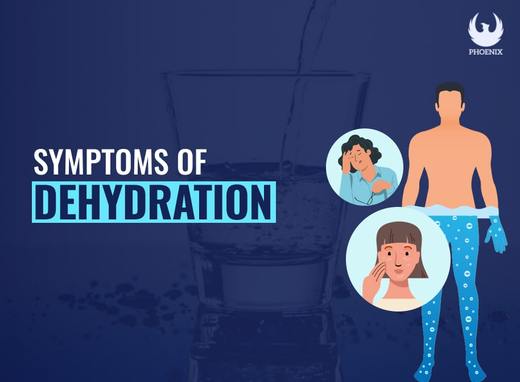Dehydration
When loss of water and other fluids exceeds their intake, the body is said to be suffering from symptoms of dehydration. While it is not emphasised enough often deemed unimportant, there are many benefits of drinking water. Even mild levels of dehydration can also cause headaches, lethargy, and constipation.
The human body is, in estimation, 75 percent water. Water is found inside cells, blood vessels, and in between cells and thus constitutes the major portion of our physical self. Without it, the body cannot sustain itself. The strength of our thirst mechanism, which tells us when we need to increase fluid intake and replenish, is an indicator of the immense need that the body has for hydration.
Water is constantly lost throughout the day as we breathe, sweat, urinate, and defecate. This makes it crucial that we restore water content in our body by drinking more fluids and consuming hydrating snacks. Coconut water and lemon water are great ways to rejuvenate and overcome symptoms of dehydration. Most cases of dehydration can be easily brought into control by maximising fluid intake, however severe cases of dehydration require medical attention.
Causes of dehydration
Illnesses such as vomiting or diarrhoea which result in excessive bowel excretion and throwing up the food intake, result in loss of fluids which the body finds hard to replenish and thus, causes dehydration.Sweating due to strenuous activities or exercises also makes the body lose its water content.Fever makes the body lose its electrolytes, minerals and fluids through excessive sweating to cool down the body temperature which can often lead to dehydration.
Look Out For These Symptoms of Dehydration
- Excessive thirst
- Strong odour and dark yellow urine
- Dizziness
- Fatigue
- Dry mouth, lips and eyes
- Barely urinating, less than 4 times a day
Symptoms of Severe Dehydration
- Increased heart rate
- Difficulty concentrating
- Fast and shallow breathing
- Dry and shrivelled skin
- Diarrhoea
- Blood in stool
- Inability to keep fluids
How To Rehydrate?
Drinking milk helps balance the water in the body as it consists of electrolytes concentration which can rectify most symptoms of dehydration. However, it is not suitable for lactose-intolerant people.
Oral Rehydration Solutions (ORS) are a godsend. Recommended by most health organisations, ORS are very efficient in speeding up the hydration process. Its constituents, sodium, glucose and electrolytes, are quickly absorbed by the bloodstream that sends you on a quick road to recovery.
You need not always drink your water. You can eat it! Fruits and vegetables contain up to 99% water and are a great snack for hydration. For convenience, keep cucumbers, berries, melons, oranges and grapes handy.
You can even concoct an effective rehydration solution at home by simply dissolving sugar and salt in water as it acts as an electrolyte replacement. A ‘Do It Yourself’ to cure symptoms of dehydration, it doesn’t get easier than this!
A Reminder For Your Health and Well Being
Replenish yourself with water intake at regular intervals and especially before any sports, exercises or activities that may exert you. Even during inactivity, make sure to drink enough water and keep yourself hydrated. And to ensure that water you are drinking is safe, check out our Pheonix Gravity Water Filter and Purifier to get great-tasting, purified water on demand.

